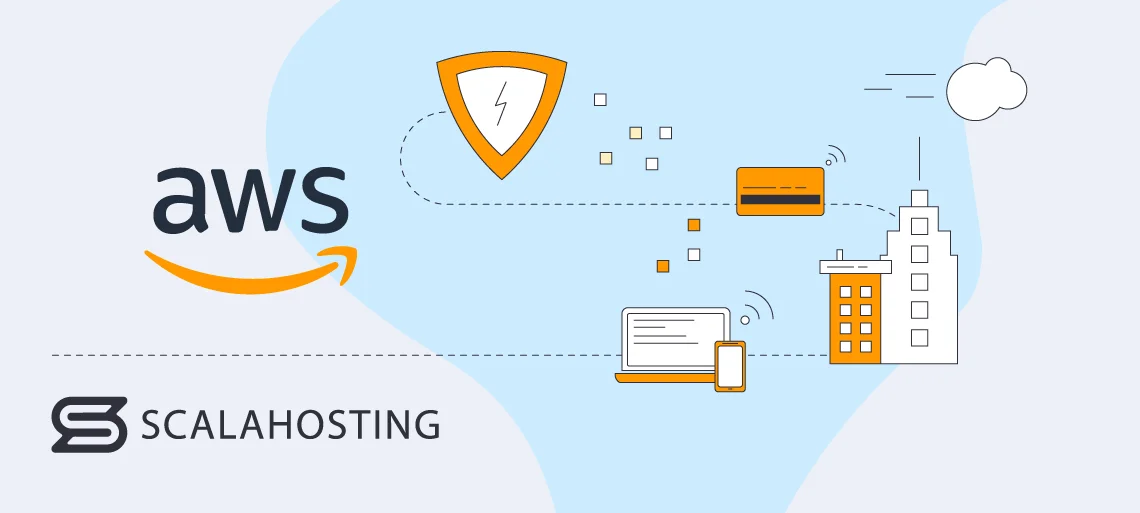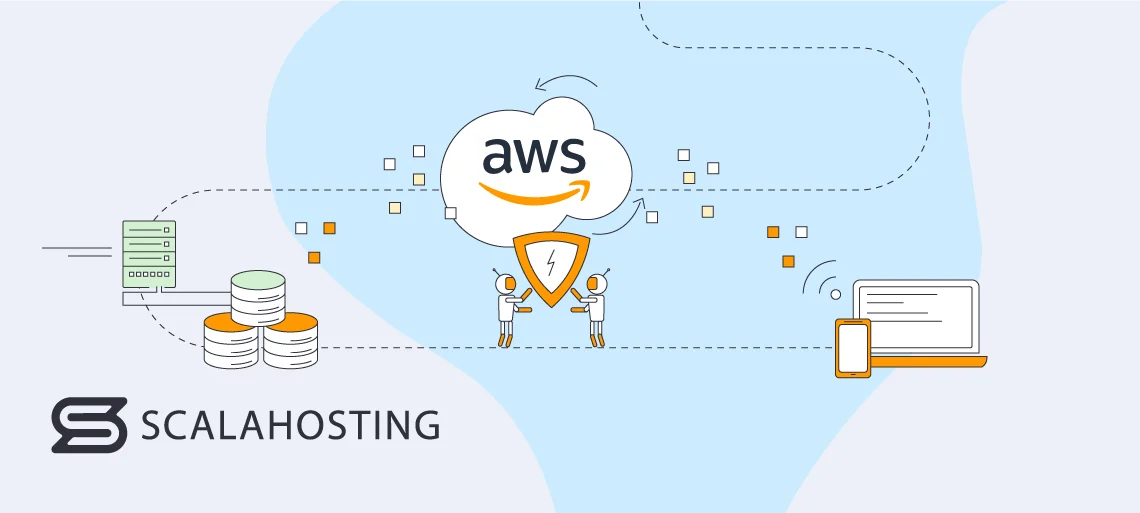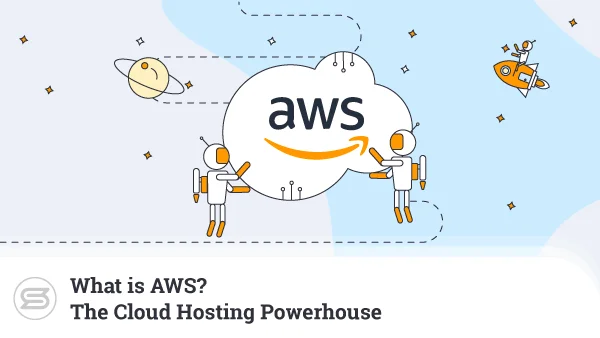What is AWS Cloud Security? How Does it Work?
Having a website is essential for your business growth, but keeping it secure might be more challenging than you think. Nowadays, as technology advances, hackers have hundreds, if not thousands, of ways to interfere with your data and cause data breaches. That’s why you need to find a reliable security solution that will always safeguard your confidential information.
Luckily, you can opt for AWS cloud security.
It includes built-in security features, such as firewalls, encryption, private connections, and many more that we’ll cover in today’s article. So, are you ready to learn more about AWS cloud security and how it works?
Let’s begin!
What is Amazon Web Services (AWS) Security

The AWS cloud operates on a shared responsibility model. More precisely, AWS is responsible for securing its cloud infrastructure, while you need to safeguard your own data and workloads. However, Amazon provides various security tools and features that will help you implement a rock-solid security policy. For example, you can benefit from key management, encryption, and identity and access management (IAM).
What’s more, you also need to follow compliance standards and regulations to maintain your security. While AWS offers a certificate for many global compliances, it does not guarantee compliance for the workloads you deploy on the platform. That’s why you need to do research and understand the compliance obligations. As a result, you will be able to use various Amazon tools, implement the necessary security and privacy measures, and stay safe from cyberattacks.
How Does AWS Security Work?
To get a clearer image, we’ll explain the security process in more detail. As mentioned, Amazon has a secure cloud infrastructure with many features, such as firewalls, private connections, encryption, and cross-service Transport Layer Security (TLS). However, AWS is only responsible for the infrastructure layer and the service layer in the case of managed services.
As the site owner, you are still responsible for different tasks in the authentication and access, operating systems, application networks, and third-party integration processes. In other words, AWS only offers the tools, and you need to implement and configure them accordingly. For example, you can limit access to sensitive data or loosen the control on data intended for public use.Luckily, AWS collaborates with ScalaHosting, so by purchasing a managed AWS VPS plan, you can get expert assistance that will take care of all crucial processes for you. At the same time, you can focus only on what you do best – business!


AWS Cloud Security Features and Best Practices
AWS cloud security comes with many different features and practices. But before we get to that, let’s outline the different security categories you should watch out for. The AWS cloud infrastructure includes the following:
- Identity and access management: AWS Identity Services help you manage identities, resources, and permissions securely. You can utilize the services for your workforce and customer-facing apps so you can get started quickly and control access to your workloads and applications.
- Detection: This group allows you to detect and identify any potential security misconfigurations, threats, or unexpected behaviors. As a result, you’ll prevent unauthorized or malicious activity within your website environment.
- Network and application protection: The network and application protection services help you implement advanced security policies at some network control points across your organization. More so, AWS allows you to inspect and filter all traffic to prevent unauthorized resource access at the host-, network-, and application-level boundaries.
- Data protection: AWS offers a service for protecting your data, accounts, and workloads from hacker attacks. These security practices come with encryption capabilities, key management, and sensitive data discovery.
- Compliance: You can get a comprehensive view of your compliance status. In other words, you can monitor your environment at all times by utilizing automated compliance checks based on AWS best practices and industry standards.
Now, let’s get into more detail about the actual security features you can implement for a highly secure business experience.

Encryption
Amazon offers built-in AES-256 encryption for several services, such as Elastic Block Store (EBS), Simple Storage Service (S3), Relational Database Service (RDS), and Redshift. The encryption goes through the AWS Key Management Service (KMS), which offers many key control options.
Moreover, you can choose from Server-Side Encryption (SSE) WITH Amazon S3-Managed Keys (SSE-S3), SSE with AWS KMS-Managed Keys (SSE-KMS), or SSE that uses Customer-Provided Encryption Keys (SSE-C) with KMS. Therefore, AWS ensures you’ll get robust security.
Keep in mind that the AWS service-managed keys are available for free, but they only provide server-side encryption. If you’re looking for more control, you can purchase the AWS Key Management Service (KMS), which offers a paid option. You’ll be able to create a unique encryption infrastructure or use an AWS-defined Customer Master Key (CMK).
Secure Cloud Resources Access
The AWS cloud security comes with an IAM security tool that enables you to assign different levels of access to your cloud resources and APIs. To achieve successful protection, you may create policies that will work in accordance with the role instead of individual user needs. This method follows the principle of least privilege.
Also, you can establish password policies that will prevent using weak and recycled passwords. IAM is responsible for defining, enforcing, and managing user access policies. It also controls access to cloud resources, service APIs, and the Amazon Console.
In addition, AWS Identity and Access Management (IAM) is a helpful security service that offers secure login options through AWS Multi-Factor Authentication and AWS Single Sign-On (SSO).
Limit AWS Security Groups
AWS security allows you to ensure that only selected security groups will get access to confidential data. This practice keeps only the necessary ports open. Additionally, you can employ the AWS Config or AWS Firewall Manager to automate the configuration of the Virtual Private Cloud (VPC) security groups.
To determine the permitted access to VPC networks, Amazon Inspector offers a Network Reachability package. Due to this, you can choose which networks can access the VPC ones. However, you must be aware of this limited access practice, which is why you need a monitoring solution.
Here is where AWS CloudTrail could help. This tool will help you monitor the cloud environment, including API calls and console actions. Also, you can utilize Amazon GuardDuty, which allows you to get real-time log analysis that will detect any suspicious behavior.
Still, the limited access requires effective management of multiple accounts and teams. Luckily, you can use the AWS Control Tower tool. This will help you set up and oversee the environment with ease.
Secure Infrastructure
Despite offering top-notch encryption, AWS security also comes with built-in security protocols within its cloud infrastructure. You can benefit from tools that will enhance your privacy and network access, such as network firewalls, connectivity options, and DDoS mitigation. More so, once you enable any of these features, they will automatically encrypt your data as soon as you send it across the global network.
The best part is that you don’t need to pay any extra fees for these features. In terms of system resources, thanks to the pay-as-you-go model, you will pay only for the resources you use, allowing you to save money on unnecessary security measures. If you want to enhance your website security even more, you can subscribe to an AWS VPS hosting plan atScalaHosting. We’ll provide you with free SSL certificates, 24/7 real-time cyber security, blacklist monitoring, anti-spam protection, and daily backups.

Security Compliance
AWS includes third-party validation for different compliance requirements and regulations. For example, it covers SOC 1, SOC 2, SOC 3, ISO 9001/ISO 27001, PCI DSS, HIPAA, and GDPR. For an even more secure experience, AWS also offers reporting tools that allow you to check data compliance with different regulators.
Still, it’s worth noting that although AWS shares the security compliance standards with you, it’s still your responsibility to ensure your business meets all specific compliance requirements that apply to it.
Quick Summary: Benefits of Using AWS Security
AWS is one of the best security boosts for a safe online experience. Now that we’ve learned about its features and practices, let’s make a quick summary of its most notable benefits.
- Control – you are the only one to determine where you store the sensitive data and who can access it. AWS made this possible by combining access controls with continuous monitoring. This ensures you have access to the right resources at all times.
- Task Automation – this will reduce human configuration errors, freeing more time to focus on critical business things, like scaling and business innovations.
- Third-party Evaluation – you can ensure your business meets global compliance requirements. AWS helps you monitor regulatory requirements and fulfill security and compliance standards.
Final Thoughts
Amazon Web Services is a top-tier cloud service provider with incredible security tools and add-ons. By implementing some of their offerings, you can take your business security to a whole new level while keeping all confidential data safe from prying eyes.
However, remember that you’re responsible for implementing each feature you like to add to your ASW hosting plan. That’s why you need a reliable hosting provider that can take care of this instead of you!
FAQ
Q: What benefits does AWS security offer?
A: If you decide to use AWS security, you will enjoy enhanced control and access management, security task automation, robust firewall, compliance and regulatory support, free built-in security tools, and much more. All of this helps you protect your data and avoid potential security risks and breaches.
Q: Why do I need a web host that supports AWS?
A: You need a reputable web host, such as ScalaHosting, that works with AWS so you can focus on your business while the expert support team takes care of all necessary protection practices. You can count on professional assistance to guarantee your server and network are impenetrable while you focus on securing your website or app.
Q: How does AWS security work?
A: AWS security comes with many tools and features for impressive security. Once you decide which feature you would like to implement, AWS activates them automatically. You can also ask the AWS support for help if you’re facing any troubles with the integrations.


